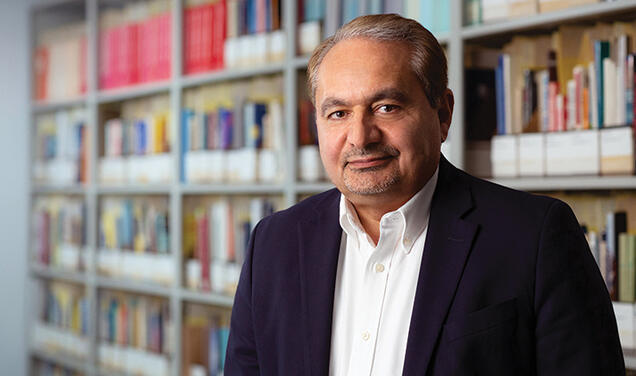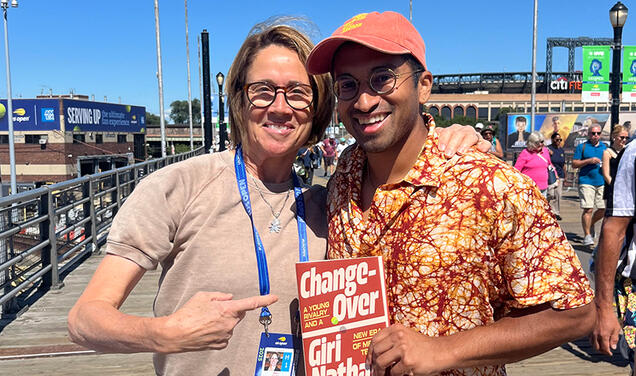A New Calendar
Exams to move from January to December; two-week Wintersession to be created

Princeton will move fall-semester exams to December and create a two-week Wintersession term in January as part of major changes to the academic calendar approved by the faculty. The new calendar will take effect with the 2020–21 academic year.
The calendar changes won approval by an overwhelming margin at the April 23 faculty meeting. Professors who packed the Faculty Room broke into applause as the vote became clear.
Faculty members spoke both for and against the changes. Many of those in favor noted that Wintersession could allow students to travel abroad or to take non-credit-bearing courses; that moving exams before winter break would alleviate stress for students; and that earlier exams would benefit students from lower socioeconomic backgrounds.
“Going home for the holidays and then going home again [after finals] is a serious disadvantage to many of the new types of students that we’re trying to recruit to come to Princeton, who are disadvantaged socioeconomically,” said molecular biology professor Elizabeth Gavis. “They have no way to do what some of the more well-to-do and traditional students do.”
AT A GLANCE:
THE REVISED CALENDAR• Fall-semester classes start the Tuesday after Labor Day or the Wednesday preceding the holiday
• Fall break is in mid-October, after the sixth full week of classes
• 12 weeks of class instruction each semester
• Reading period is one day shorter in the fall, unchanged in the spring
• Fall-semester exams are in December; semester ends Dec. 19–23 each year
• A two-week Wintersession starts Jan. 10–16 each year
• Spring semester starts and ends one week earlier
• Reunions and Commencement are one week earlier
• Summer break is one day shorter in five years out of seven, one week shorter in two years out of seven
Some professors were skeptical that much could be accomplished over a two-week, optional Wintersession period; others expressed concern that starting classes earlier could cut back on faculty research; and others said that the new calendar is not as family-friendly as the current one.
“It’s bad for parents of young children, and that’s particularly bad for women faculty,” said philosophy professor Elizabeth Harman. “As things stand now, [faculty] parents can send their children off to the first days of public school and then have about two weeks to prep for our semester.”
Computer science professor Aarti Gupta, who chaired the calendar-reform committee, said it was impossible to develop a “perfect calendar” that would accommodate the needs of everyone.
“We have to balance these competing interests and then make choices,” Gupta said. “We know that efforts to just fix one small aspect or another inevitably have a domino effect such that even small changes can throw other elements out of whack.”
The undergraduate and graduate-student governments voted in favor of the proposal in the weeks leading up to the faculty vote. USG academics chair Olivia Ott ’20 said the faculty’s action was “a historic moment” for Princeton.
“Our students will no longer have to think about beginning end-of-term assignments when they head home in December,” Ott said. “They won’t have to worry that they’re falling behind their classmates if they don’t start studying before the first of January, nor feel left out when not able to financially afford to travel home twice for two breaks in a six-week period.”
Going forward, a faculty committee will begin developing calendars for the 2020–21 academic year and beyond, said Elizabeth Colagiuri *99, deputy dean of the college. She added that the provost will likely form a committee to begin planning for the Wintersession period, and that many groups on campus have already begun to brainstorm ideas such as workshops, thesis boot camps, travel, fieldwork, and service opportunities.
Princeton moved fall-term exams after winter break in 1939–40 to provide freshmen and sophomores with two reading periods and is now the only institution among its peers to hold finals in January. The University last considered a change to the academic calendar in 2007–08.
A version of this story, titled “Update: Exams to Move Before Winter Break in ’20-’21,” was published online April 24, 2018.










2 Responses
Winston Weinmann ’80
7 Years Ago"Orange and Black Holiday" with Princeton in Session
PAW’s article on moving fall-semester exams to before Christmas (On the Campus, May 16) notes that fall break will now be in mid-October.
Not mentioned: The most “orange and black” holiday (if one leaves out Reunions), Halloween, will now be during school instead of during fall break.
Having All Hallows’ Eve when students are on campus will likely lead to a variety of new Princeton traditions celebrating the Orange and the Black.
Michael MacCracken ’64
7 Years AgoWill This Change Dates for Graduation and Reunions?
Will the change in the calendar affect the scheduling of graduation and Reunions, moving them up in May?